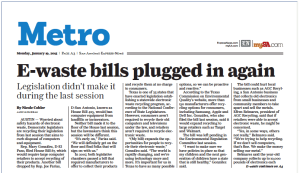San Antonio Express-News & Houston Chronicle
AUSTIN — Worried about safety hazards of electronic waste, Democratic legislators are recycling their legislation from last session that aims to curb disposal of computers and equipment.
Rep. Mary González, D-El Paso, filed House Bill 87, which would require large computer retailers to accept recycling of their products. Another bill dropped by Rep. Joe Farias, D-San Antonio, known as House Bill 423, would ban computer equipment from landfills or incinerators.
Neither bill made it to the floor of the House last session, but the lawmakers think this session will be different.
“It’s early on,” Farias said. “We will definitely get on the floor and find folks that will sign on with us.”
In 2007, both legislative chambers passed a bill that required manufacturers to offer to collect their products and recycle them at no charge to consumers.
Texas is one of 25 states that have enacted legislation establishing a statewide electronic waste recycling program, according to the National Conference of State Legislatures. However, consumers aren’t required to recycle their old computers and televisions under the law, and retailers aren’t required to recycle electronic waste.
“(My bill) expands the opportunities for people to recycle their electronic waste,” González said. “The world is rapidly changing, and we’re using technology more and more. It’s important for us in Texas to have as many possible options, so we can be proactive and reactive.”
According to the Texas Commission on Environmental Quality’s website, more than 130 manufacturers offer recycling options for consumers, including Samsung, Apple and Dell Inc. González, who also filed the bill last session, said it would expand recycling to large retailers such as Target and Walmart.
The bill was left pending in the Environmental Regulation Committee last session.
“I want to make sure we have policies in place so that my children and the next generation of children have a state that is still healthy,” González said.
The bill could hurt local businesses such as AGC Recyling, a San Antonio business that collects old electronics from small businesses and community members to take apart and sell the metals. Efren Belmares, president of AGC Recycling, said that if retailers were able to accept electronic waste, he might be concerned.
“Yes, in some ways, others not really,” Belmares said. “We’re trying to help recycling. If we don’t sell computers, that’s fine. We make the money selling our metal.”
Belmares said the year-old company collects up to 10,000 pounds of electronics each month and donates any computers that it’s able to fix.
Andrew Dobbs, the Central Texas program director for Texas Campaign for the Environment, said the nonprofit supported González’s bill in 2013 and plans to watch the bill this session.
Dobbs said about 40 million pounds of electronic waste are recycled annually. However, he said on average, each person dumps 15 pounds of electronic waste a year.
“It’s higher now than it was when it started,” Dobbs said. “We’re coming up against a brick wall on it, and we need solutions to increase programs. This would be a good move forward.”
The bill was opposed last session by the Texas Retailers Association, and according to President Ronnie Volkening, the organization plans to oppose the bill if it remains as is.
Volkening said a bill passed in 2011 that was agreed upon by retailers and environmental groups alike was a reasonable law. Under the 2011 bill, retailers are required to sell products by the TCEQ approved list, and do not require a retailer to collect covered television equipment for recycling.
“We worked with a broad-based group to address this in a way that limits the burden on retailers, but also provides toll free numbers for consumers to bring their products back,” Volkening said.
According to Volkening, smaller retailers or online sites that sell electronics may not be able to handle the burden of recycling consumer’s products under the new legislation.
“That for some retailers is quite a burden because they generally don’t have stores with that kind of space,” Volkening said. “Electronic products that may be bought online by sellers may not have any store in the state of Texas.”
González’s bill is not the only piece of legislation addressing electronic waste this session. Farias has a bill which would ban people from discarding computer and TV equipment on municipal land.
The bill was introduced last session and was passed through committee after it was amended. Farias said there was a lot of push back from the industry, and the bill was halted in the Calendar Committee.
“For the landfill, the least regulation they have, the better it is for them,” Farias said. “What I can’t stress enough is that it’s about protecting water resources, not about hurting anybody.”

